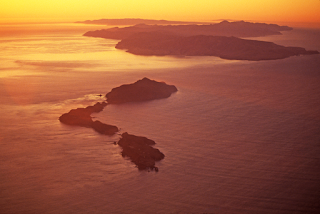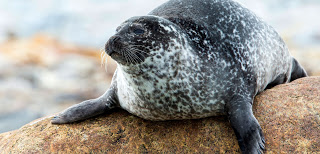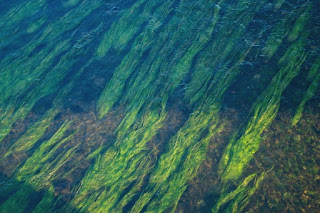Read More…
—————————————————
 In a move to protect the fragile Belize Barrier Reef, UNESCO World Heritage Site, the Belize government has announced bold legislation to end oil activity in all of its waters. This new law will protect the second-largest reef in the world. It is home to 1,400 species, including endangered hawksbill turtles, manatees, rays and six threatened species of shark. “Legislation to stop offshore oil drilling in Belize is an extremely wise decision,” said Ralph Capeling, co-owner of Splash Dive Center in nearby Placencia. “The economic potential of the reef clearly exceeds the value of any potential discoveries.”
In a move to protect the fragile Belize Barrier Reef, UNESCO World Heritage Site, the Belize government has announced bold legislation to end oil activity in all of its waters. This new law will protect the second-largest reef in the world. It is home to 1,400 species, including endangered hawksbill turtles, manatees, rays and six threatened species of shark. “Legislation to stop offshore oil drilling in Belize is an extremely wise decision,” said Ralph Capeling, co-owner of Splash Dive Center in nearby Placencia. “The economic potential of the reef clearly exceeds the value of any potential discoveries.”Read More…
—————————————————
3. China Oil Spill Threatens Marine Life
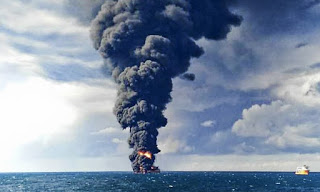 An Iranian tanker collided with a Hong Kong cargo ship on January 6, catching on fire and then sinking off the coast of Shanghai. The Sanchi tanker caused a massive spill of condensate, a light crude oil. “The condensate that leaked into the water could potentially wreak havoc on local fish spawning grounds, and the Sanchi sank in the migratory path of the humpback whale, according to Greenpeace.” This latest spill raises alarms about the potential risks of new drilling proposed by the Trump administration off formerly protected U.S. coasts.
An Iranian tanker collided with a Hong Kong cargo ship on January 6, catching on fire and then sinking off the coast of Shanghai. The Sanchi tanker caused a massive spill of condensate, a light crude oil. “The condensate that leaked into the water could potentially wreak havoc on local fish spawning grounds, and the Sanchi sank in the migratory path of the humpback whale, according to Greenpeace.” This latest spill raises alarms about the potential risks of new drilling proposed by the Trump administration off formerly protected U.S. coasts.
4. Switzerland Deems Lobster Boiling Inhumane – World First to Recognize Crustacean Pain
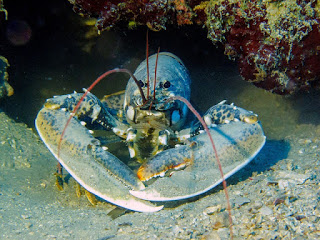 Switzerland’s ban against boiling lobsters alive is one of the world’s first. The law, which takes effect in March, requires that lobsters be stunned before they are cooked. Lobsters and other crustaceans must also be kept in a natural environment rather than on ice or in ice water. Animal rights groups applaud the move, which follows years of debate about whether lobsters can actually feel pain. A 2013 study in the Journal of Experimental Biology seems to put that notion to rest.
Switzerland’s ban against boiling lobsters alive is one of the world’s first. The law, which takes effect in March, requires that lobsters be stunned before they are cooked. Lobsters and other crustaceans must also be kept in a natural environment rather than on ice or in ice water. Animal rights groups applaud the move, which follows years of debate about whether lobsters can actually feel pain. A 2013 study in the Journal of Experimental Biology seems to put that notion to rest. —————————————————
5. Thorny Debate Over Australia’s Starfish Control Program
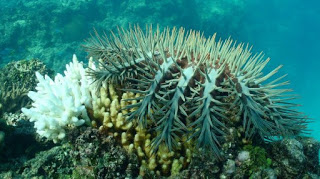 The voracious crown-of-thorns starfish is gobbling up coral on Australia’s Great Barrier Reef. The starfish is devastating a reef already reeling from two mass bleaching events in recent years. Now a review of the government’s starfish control program asserts “a serious case of negligence” in a program that will likely fail.
The voracious crown-of-thorns starfish is gobbling up coral on Australia’s Great Barrier Reef. The starfish is devastating a reef already reeling from two mass bleaching events in recent years. Now a review of the government’s starfish control program asserts “a serious case of negligence” in a program that will likely fail.
—————————————————
6. Ringed Seals Adopt Landlubber Survival Strategy
The ice on Norway’s Svalbard archipelago is shrinking—and some areas are now completely devoid of ice. Conservationists are concerned about the effect on ringed seals, who depend on sea ice to rest and molt. The seals also build lairs on the ice to shelter their pups until they grow enough blubber to survive the icy waters. Now a new study reveals a seal survival strategy: they are spending more time on land. The adaption is a good sign, but time will tell how ringed seals will survive the rapid changes transforming their world.
Read More…
———————————————–
Seagrass, along with mangroves and salt marshes, stores “up to 100 times more carbon than tropical forests at 12 times the speed. Vast prairies of sea grasses stretch for kilometers along the seafloor, storing enough carbon to rival the world’s forests.” But warming oceans threaten that critical carbon sink. “We can see that the coasts of Australia, Polynesia, and Hudson Bay will lose seagrass if ocean temperatures rise 1.5°C,” says Orhun Aydin, a researcher at the Environmental Systems Research Institute in California. “The species Zostera marina only grows in these areas and will become extinct.” That’s bad news for all of us. “Global warming is actively destroying mechanisms for storing carbon dioxide. This means increasing temperature will not be a linear process; intuitively, I’d say it will be exponential.”
Read More…
—————————————————
 The yellow-bellied sea snake has the widest range of any snake on the planet. And if the last few years are any indication, its range might be getting even bigger—thanks to climate change.
The yellow-bellied sea snake has the widest range of any snake on the planet. And if the last few years are any indication, its range might be getting even bigger—thanks to climate change.
Read More…
—————————————————
Sea Save Foundation is committed to raising awareness of marine conservation. The Week in Review is a team effort produced by the Sea Save staff to provide a weekly summary of the latest in marine research, policy, and news.

